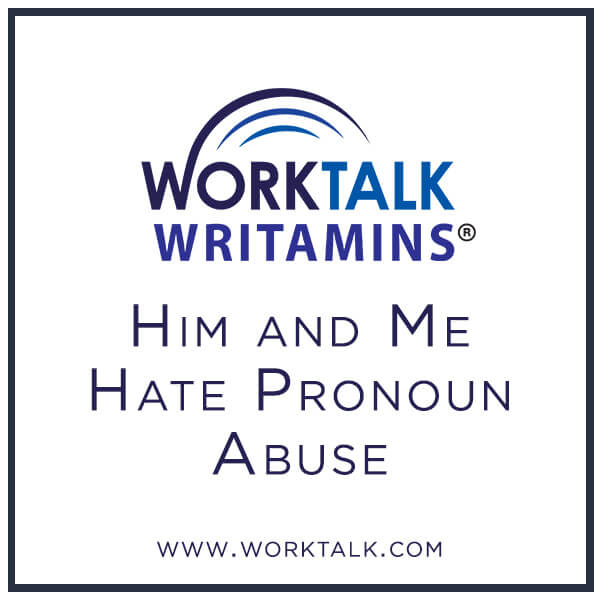[4 minutes to read]

Her and me went to the theater.
Me and Eddie are going to the mall.
The wedding invitation was addressed to she and I.
AARRGGHH!
Sentences like these are careening around the world of spoken and written business communication, landing like fingernails on a chalkboard to anyone who cares about language. And there are people who care about language (aren’t there?).
Two Groups of Pronouns
To understand why these usages are so galling, writers need to understand that there are two groups of pronouns. Quick reminder: A pronoun is a word that stands in for a noun. Pronouns protect us from writing sentences like Gerald drove Gerald’s car to Gerald’s mother’s house and brought Gerald’s mother a cake. With pronouns, we could swish along and write Gerald drove his car to his mother’s house and brought her a cake.”
One group of pronouns includes words like I, he, she, they, and we; these words appear (we hope) only in the subject of a sentence. The subject tells who or what the sentence is about. So we would write, She went bowling. Note that we would never write Her went bowling. That would be weird.
The other group of pronouns includes words like me, him, her, them, and us. These words appear when they are the object of a verb or preposition*. So we would write Sally went bowling with her because with is a preposition. Objective pronouns would likely come after the verb (action part) of the sentence. For example, The bowling ball hit her. Again, you would not write, The bowling ball hit she.
Other People Create Trouble
Most people are fairly savvy when using pronouns to describe one person. Confusion arises when multiple people enter the scene. That’s when we start to see sentences like Her and me are going out now. Why is this wrong? Because Her and me appear in the subject of the sentence, but they are objective pronouns: They don’t belong in that part of the sentence, The correct sentence would be She and I are going out now.
Keep Everything in its Place
In short, one group of pronouns (he, she, I, we) belongs in the subject of a sentence, telling who or what the sentence is about. Another group of pronouns (him, her, me, us) belongs after a verb or a preposition. And never the twain shall meet.
Someone needs to send this Writamin to Paul Simon. How could he write a song called “Me and Julio Down by the Schoolyard” when everyone knows it should have been “Julio and I Down by the Schoolyard?” Not. There is a place for creative license. So if you and me want to go to the store, let we go there.
* A preposition is anywhere a rat can run as well as of. So prepositions include words like in, to, for, with, by, on, near, above, below, between, and many more.
©2019 Elizabeth Danziger All rights reserved
